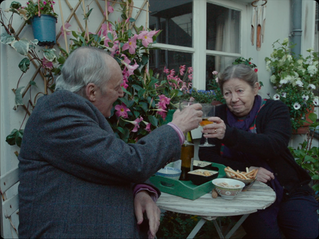Dekalog, jeden
- Isobel Wise
- Nov 1, 2020
- 3 min read
Krzysztof Kieślowski, 1988
‘Chaos and disorder ruled Poland in the mid-1980s. I sensed mutual indifference behind polite smiles and had the overwhelming impression that I was watching people who didn’t really know why they were living’. - Kieślowski on Kieślowski, 1993
Writing of his ode to a quotidien Poland, film director Krzysztof Kieślowski, illustrates the milieu, intention and plot behind his acclaimed Dekalog (1988). Composed as ten short films for television, the series narrates the social hardships, personal turmoils, and everyday difficulties of individuals living in an apartment block in Warsaw. Taking inspiration from the Ten Commandments, each short considers ethical dilemmas, each being an exploration of larger fundamental and humanistic questions regarding society, relationships, faith, and the purpose of living. Whilst melancholic portrayals of death, disease and love permeate the screenplays, it is the intimate examinations of mortal vulnerabilities and complexities that Kieślowski chooses to prioritise in each film. Though often regarded as a thoroughly bleak portrait of 1980’s Poland, at its core, Dekalog, is a sublimely poignant and considered illustration of human existence.

Dekalog, jeden follows Paweł, 10, living with his father who runs a computer business out of their apartment. The eerie, viridescent glow of the computer screen illuminates their interactions in which they eagerly converse and calculate sums. Bright-eyed, inquisitive and acutely empathetic, Paweł shares his father’s appetite for science and mathematics. Yet where his father, Krzysztof, is content with rationality, Paweł’s curiosity troubles him. Saddened by the discovery of a dead dog on their estate, Paweł asks Krzysztof to explain the meaning of death. His father replies with a reasoning that is cold in its conviction, ‘- the heart stops pumping blood, no blood reaches the brain, everything stops: the end’. Paweł’s aunt, concerned for her nephew’s spiritual education, proffers an explanation that instead elaborates upon religion and the existence of the human soul. As empiricism and spirituality are presented — whether set in tandem or opposition Kieślowski refuses to explicitly state — the audience, alongside the young Paweł, are encouraged to explore the limits of both.

Though certainly a masterclass in crafting a narrative that is compelling and convincing, Dekalog, jeden, never feels overly concerned with its fiction; nor a product of artificiality. Its ability to explore philosophical subjects within a believable world makes for a film devoid of contrivances, all the while perfectly formed and affecting. Through the character of Paweł, Kieślowski considers human purpose — the boy asks for the meaning of death so the audience can consider the meaning of life. His curiosity and compassion compete with his vivacity and anxiety, and because he is written in earnest, he is never reduced to a mere plot device.

In one scene, wherein Krzysztof pontificates upon the infinite potential of technology, the camera deliberately focuses on Paweł in the audience, capturing his attempts to amuse himself by peering at his father from behind the slide projector. Later on, the pair enter a competitive chess game. Victory is attained through Paweł’s logistical approach yet the scene refuses to celebrate cognition alone. Instead Kieślowski cherishes the devotion exhibited between the father and son, their affection, camaraderie, and mutual admiration. Here, restated in miniature, exists the film’s ethos. By encouraging the audience to consider emotion alongside reason, the mundane alongside the profound, Kieślowski achieves a work that is more liberal than didactic.


As the film develops and reason is threatened by tragedy, the score gives way to a section that is soundtracked solely by diegetic sound. Alarms, sirens, doorbells, car horns, humming engines, ringing telephones and barking dogs surround Krzysztof as the news of an incident is filtered through the housing estate. Whilst being an inspired parallel to Krzysztof’s faltering sense of truth — only sounds available to him are heard — this diegesis further reveres the quotidien. Despite being a large-scale production, Dekalog lauds the prosaic and monotonous humdrum that accompanies everyday life. Loneliness, wonder, grief and desire are examined through details of sheer existence: foodstuffs strewn over kitchen counters, inkblots saturating misplaced papers, soured milk curdling in coffee. Highlighting a humanity shared between each other and our world, Kieślowski conjures an empathy for details independent of germane filmic action. Falling cigarette ash, bread crumbs in the butter, Paweł running with his aunt, Krzysztof applying cologne — this is where Dekalog, jeden lingers and develops feeling. Individuality and coexistence are not pondered in the outrageous but in the quiet and ordinary; Dekalog, jeden, implies it is here the answers can be found.








Comments